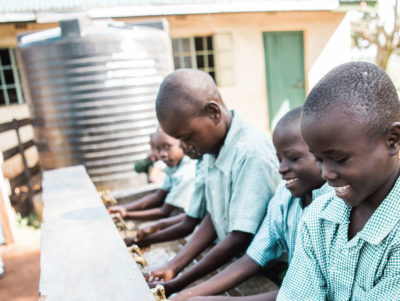
Local organizations around the world are engaged in on-the-ground efforts to reach vulnerable communities by recruiting local people to become “community health workers” (CHWs) who help teach about life-saving healthy habits such as prenatal care, nutrition, vaccines, and proper sanitation and hygiene. Here we profile a community-founded organization that works to improve the health of residents in rural Migori County, Kenya.

What It Does
Located in the province with the highest HIV rates in Kenya, this community has also faced a high number of preventable maternal and child deaths, as well as the ongoing threat of political violence. Lwala’s founders, brothers Drs. Milton and Fred Ochieng, grew up in Lwala Village and watched neighbors and family members needlessly die of causes such as HIV/AIDS, when basic health services could have saved them.
Thanks in part to financial support from their entire community, the brothers attended medical school in the U.S. and subsequently helped build their village’s first clinic in 2007. Lwala now makes health services in its clinic, government facilities, and in the community more accessible to around 60,000 people.
Lwala employs 85 CHWs for direct community outreach to 11,000 people in its service area. To improve maternal and child health in particular, CHWs provide women and young children with basic health services such as childhood vaccinations, treatments for common illnesses, and contraception. Lwala Community Hospital is entirely staffed by local clinicians and provides outpatient, inpatient, HIV/AIDS, and maternity services. Lwala also provides training, mentorship, and quality improvement support for five additional government health facilities as part of its commitment to help strengthen the local health system overall.
How Effective Is It
With the help of university partners, Lwala conducted a household survey to assess maternal child health and HIV outcomes in 2017. It found that 97% of pregnant women in Lwala’s service area deliver their babies at a health facility with a skilled nurse, which is important for healthy birth outcomes, compared to a country average of 53%. The survey data also showed that the death rate of children under five in Lwala’s service area is less than half the regional average. What’s more, 93% of all clients testing positive for HIV are enrolled in care, either at Lwala Community Hospital or in other local health facilities. Additionally, everyone living with HIV has access to clinical care, a peer support group, and ongoing support from a community health worker.
How You Can Help
Philanthropy is particularly crucial for smaller nonprofits like Lwala that often find it more difficult to connect with both private and public international donors. In addition to certain basic resources provided by the Kenyan government (such as vaccines and essential medicines), Lwala estimates it costs $11 per child to provide holistic health services for one year, including growth monitoring, malaria treatment, and nutrition support. About $200 supports a CHW’s salary, supplies, and supervision for one month. Additional donations can also help fund a rigorous evaluation to both improve Lwala’s programming and help the Kenyan government make effective health investments. To donate any amount, visit http://lwalacommunityalliance.org/donate/.
Personalize This Project
Other nonprofits that are using innovative ways to implement local health programs include VillageReach, which supports CHWs in sub-Saharan Africa with essential communication, supply chain logistics—an overlooked aspect of reaching communities. Living Goods in Uganda/Kenya and BRAC in 11 countries use door-to-door entrepreneurial sales approaches to incentivize health workers and cover salary and distribution costs.
